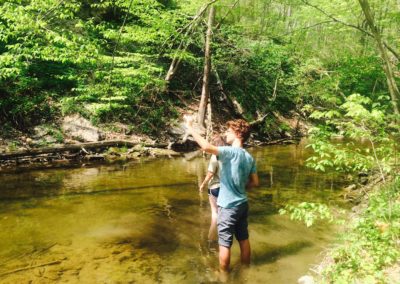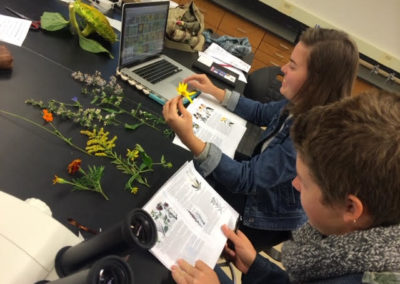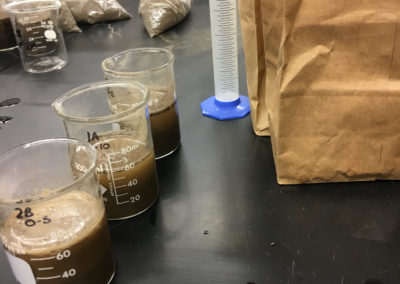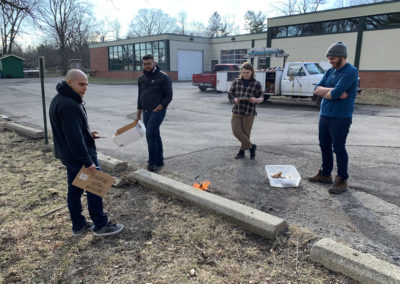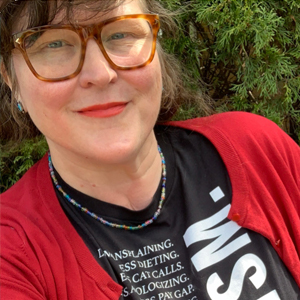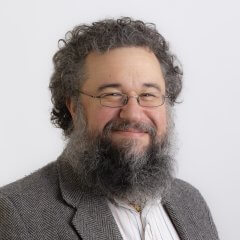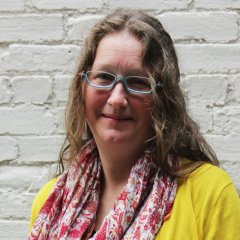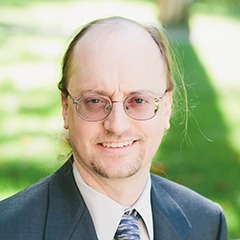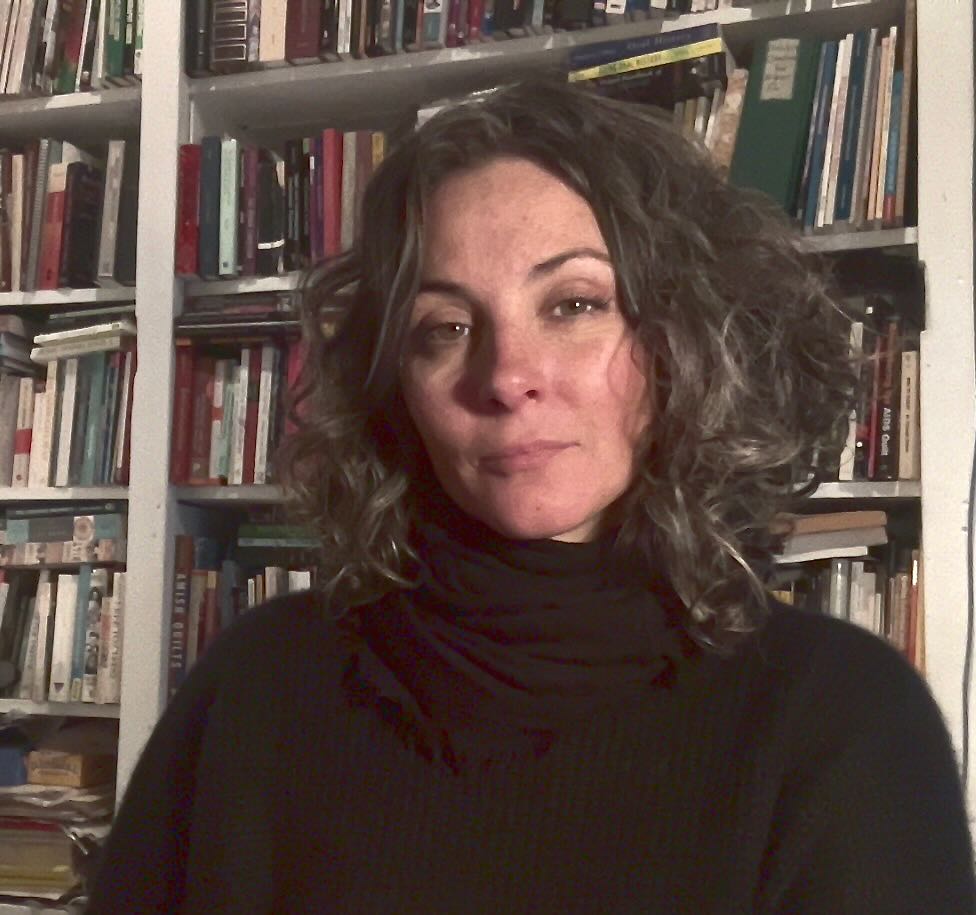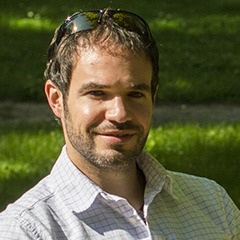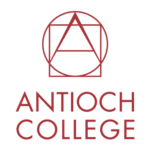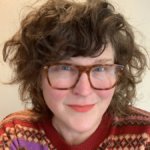Environmental Science
Students work with faculty advisors to devise self-designed majors. Coursework in the major builds upon students’ experiences in the general education curriculum while providing students with pathways to deepen their knowledge or further develop their passion in a particular area of study.
Studying Environmental Science at Antioch College
Environmental Science combines many facets of the biological, chemical, physical, and quantitative sciences in the study of natural systems. Some of the most critical challenges in the 21st Century relate to understanding environmental trends and human-induced changes on our planet. The Earth is a giant puzzle, and its systems are changing rapidly. Environmental Science allows us to understand these changes in space and time, and helps us understand and predict future challenges.
Through a combination of coursework, Co-operative Education jobs, and independent student research, the Environmental Science program at Antioch College helps students gain proficiencies in: applying quantitative and discipline-based skills for environmental problem-solving, writing and speaking effectively to communicate issues in the field, and gaining real-world experience in environmental science problem-solving. Students design their own degrees and can choose from courses in Biology, Chemistry, Environmental Science, Math, and Physics, as well as other subjects that complement a Liberal Arts education. Additional coursework may be accessed through the SOCHE cross-registration program, where Antioch students can enroll in a limited number of courses at nearby institutions. To complete their degree, each student pursues a senior project of their own design, supported by Antioch Faculty, to investigate a topic in Environmental Science. Located in Ohio’s Miami River Valley, the Antioch College campus is surrounded by forest, streams, meadows, rivers, wetlands, and other natural resources to enrich your education and recreational experience.
Designing Your Major
Course options when designing a major in Environmental Science
| Course No. | Title | Credits |
| Environmental Science | ||
| ENVS 105 | Introduction to Environmental Science | 4 |
| ENVS 205 | Ecology | 4 |
| ENVS 220 | Aquatic Biology | 4 |
| ENVS 230 | Soil: A Living System | 4 |
| ENVS 330 | Conservation Biology | 4 |
| ENVS 335 | Field Plant Ecology | 4 |
| ENVS 339 | Ecological Agriculture | 4 |
| ENVS 360 | Ecosystem Ecology with Forest Lab | 4 |
| Biology and Chemistry | ||
| BIO 101 | Principles of Biology | 4 |
| BIO 210 | Botany | 4 |
| BIO 220 | Introductory Molecular Biology and Genetics | 4 |
| BIO 230 | General Microbiology | 4 |
| BIO 410 | Integrative Physiology and Advanced Biochemistry | 4 |
| CHEM 105 | General Chemistry I + Lab | 4 |
| CHEM 160 | General Chemistry II + Lab | 4 |
| CHEM 205 | Organic Chemistry I + Lab | 4 |
| CHEM 220 | Environmental Chemistry | 4 |
| CHEM 330 | Organic Chemistry II + Lab | 4 |
| CHEM 340 | Biochemistry | 4 |
| Humanities and Social Sciences | ||
| PECO 315 | Environmental Economics | 4 |
| PHIL 221 | Environmental Ethics and Political Theory | 4 |
| Mathematics | ||
| MATH 102 | Explorations in Mathematics and Quantitative Reasoning | 4 |
| MATH 105 | Introduction to Statistics | 4 |
| MATH 150 | College Algebra | 4 |
| MATH 151 | Precalculus | 4 |
| MATH 155 | Calculus I | 4 |
| MATH 160 | Calculus II | 4 |
| MATH 205 | Intermediate Statistics | 4 |
| PHYS 160 | General Physics I | 4 |
| PHYS 260 | General Physics I | 4 |
| Research and Special Topics | ||
| SCI 101 | Foundational Topics in Sciences | 4 |
| SCI 270 | Special Topics in Science | 4 |
| SCI 297 | Independent Scientific Research | 1 to 4 |
| SCI 299 | Independent Study | 1 to 4 |
| SCI 370 | Special Topics in Science | 4 |
| SCI 397 | Advanced Scientific Research | 1 to 4 |
| SCI 399 | Advanced Independent Study | 1 to 4 |
| SCI 470 | Advanced Special Topics in the Sciences | 1 to 4 |
Real-World Student Work Experiences
Students gain valuable real-world work experience through our Cooperative Education program, and document their insights on Antioch Engaged: our journal of social practice & professional engagement
-
Fires and Felines; Prairies, Prescribed Burns and Power Tools: Brennan Mumper ’27 at Whiterock Conservancyby Brennan Mumper on May 15, 2024
I’m not too big on travelling. For most of my life, the farthest I’d ever been from where I live in central Ohio was my birthplace in central Pennsylvania. So, while Iowa, a land famous for corn and corn alone, might not seem too exciting
-
Transects, Transplants and the Transcontinental Railroad: E. Lombardi ‘25 at The Rocky Mountain Biological Laboratory in Crested Butte, Coloradoby E. Lombardi on September 5, 2023
Westward Ho! – the road to RMBL When the train jostled me awake somewhere West of Omaha, Nebraska, a few hours after crossing the Mississippi River for the first time in my life, I thought I knew what I wanted out of life. I had
-
Learning to return to the land: Yuri Whitley ‘26 at the Antioch Farmby Yuri Whitley on June 15, 2023
The Antioch farm is a small-scale farm that works to provide farm-to-table produce for our community. Our primary goal is to be able to have enough produce to feed all of the students and staff on campus continuously. Growing up in a small town surrounded
-
Zootastic Life: Colin Ross ’26 at the Columbus Zoo and Aquarium in Columbus, Ohioby Colin Ross on May 31, 2023
Growing up, my family would constantly take trips to the zoo. I would walk around holding hands with my sister as we observed the animals. Through the years, the zoo became a part of my life, being my first class field trip, where I volunteered
-
Spring, Finally: Rey Sadoff ‘26 at Antioch College in Yellow Springs, Ohioby Rey Sadoff on May 22, 2023
In your first term as an Antioch student, you will almost certainly hear warnings of winter. Professors tell you how dark, cold, and long Ohio winters can be; upperclassmen warn of the icy, miserable months to come. As a brand new college student, wide eyed
-
Finding Your Happy Place: Summer Powell ‘26 UWC-USA Agroecology Research Center Montezuma, NMby Summer Powell on May 16, 2023
Finding Your Happy Place The United World College (UWC) is an international High School where students from 95 different countries around the world attend for their junior and senior years of Highschool. UWC strives to teach students to be change makers in their communities, from
Faculty
Recent News

Antioch College Achieves Fundraising Goal Through Generous Support
Successful “Antioch Activate” Campaign Keeps College Moving Forward Yellow Springs, Ohio 1-9-23 — Antioch College launched the “Antioch Activate” campaign in September of 2022 with a goal of raising $2.5M by December 31, 2022. Through a total of 1,413 generous...
Antioch College Awarded Choose Ohio First Funds
We have to solve multiple problems simultaneously
Campus Lighting Gets an Upgrade
As the holidays approach and the Fall term comes to a close Mike Fair, Maintenance Manager at Antioch College, springs into action with campus repairs and upgrade projects.

